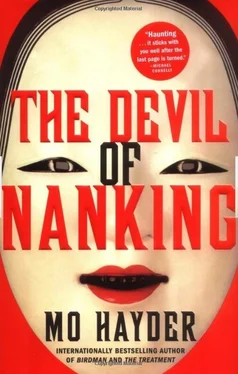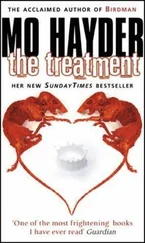Her legs had gone and so had most of her lower half. What remained had been cut at, hacked and scraped at by Fuyuki and his Nurse. Most of her had been worn away because a wealthy old man insisted on his fantasy of immortality. She couldn’t choose who looked at her or handled her. She couldn’t stop herself being kept in a tank, facing a blank wall, helpless to move and waiting… for what? For someone to come and turn her to face the light?
If I hadn’t found her the garden might have been the place she’d stayed for ever, alone in the dark, with only the rats and the changing leaf cover for company, frozen in eternity – reaching in the wrong direction. She’d have disappeared under the demolished house, and a skyscraper would have grown over her instead of a tree, and it would have been her final grave. The moment I unwrapped the carrier-bag and opened the parcel, I learned for sure that Shi Chongming was right: the past is an explosive, and once its splinters are in you they will always, always work their way to the surface.
I sat in his office with my mouth open, and stared at a point just above his head. The air in the room seemed stale and dead. ‘Your daughter?’
‘Taken by him in the war. In Nanking.’ He cleared his throat. ‘Who do you think is shown on the film if not Junzo Fuyuki and my wife?’
‘Your wife?’
‘Of course.’
‘Fuyuki? He was there? He was in Nanking?’
Shi Chongming opened his desk drawer and threw something on to the table. Two flat engraved tags, fastened on an ageing, yellowing strip of tailor’s tape. Because they weren’t on a chain it took me a moment or two to recognize them as soldier’s dogtags. I picked them up and rubbed the surface under my thumb. The kanji was clear. Winter and a tree. I looked up at him. ‘Junzo Fuyuki.’
Shi Chongming didn’t answer. He opened the cupboards that ran across the walls and pointed at them. Every shelf was crammed with stacks and stacks of paper, yellowing, torn and wedged together, secured with ribbon, string, tape and paperclips. ‘My life’s work. My only preoccupation for the last fifty years. On the outside I am a professor of sociology. On the inside I work only to find my daughter.’
‘You didn’t forget,’ I murmured, gazing at the piles of paper. ‘You never did forget Nanking.’
‘Never. Why do you suppose I speak English so well, if not to find my daughter and one day tell the world?’ He pulled out a stack of papers and dropped it with a thud on the table. ‘Can you imagine the convolutions I have been through, the time it took me to track Fuyuki down? Think of the thousands of old men in Japan named Junzo Fuyuki. Here I stand, a little man, respected internationally for my work in a field that holds no interest for me, none whatsoever, a field that has only the distinction of being the one area that would adequately cover my true purpose and allow me access to these records.’ He handed the top paper to me. A photocopy stamped by the National Defence Agency’s war history library. Now I recalled seeing the logo stamped on some of the papers in his portfolio weeks ago. ‘Imperial Army unit records. Copies. The originals – at least, those that survived transfer between here and the United States during the occupation – are very well protected. But I was lucky – after years of appeals I was at last granted access to the records, and then I found what I needed.’ He nodded. ‘Yes. There was only one Lieutenant Junzo Fuyuki in Nanking in 1937. Only one. The yanwangye of Nanking. The devil – the guardian of hell. The man who hunted for human flesh to cure himself.’ He rubbed his forehead, corrugating his skin. ‘Like all the other soldiers, like almost every Japanese citizen who returned from China after the war, Fuyuki brought with him a box.’ Shi Chongming held out his hands to indicate the shape and the size. ‘Hanging round his neck.’
‘Yes,’ I said faintly. I remembered it. A white ceremonial box, lit and displayed in the corridor of the apartment next to Tokyo Tower. It should have brought back to Japan the ashes of a fellow soldier, but Fuyuki’s had been used for something else.
‘And with that baby he brought something else.’ Shi Chongming gazed sadly at the reams and reams of paper. ‘He brought the grief of a parent. He dragged with him a line… a line from here,’ he put his hand on his heart, ‘from this place to eternity. A line that could never be cut or shaken off. Never.’
We were both silent for a long time. The only sounds were of the trees outside the window, moving in the wind, occasionally bending to run their fingers lightly across the glass pane. At length Shi Chongming wiped his eyes and got to his feet, moving slowly, slightly bent, across the familiar spaces, the well-worn paths between the few pieces of furniture. He wheeled the film projector into the centre of the room, plugged it in and crossed awkwardly, without his stick, to where a small portable screen stood near the window. He rolled it down and secured it to the base of the stand. ‘Here it is,’ he said, as he unlocked a lower drawer and took out a rusting film can. He eased it open. ‘The first time anyone has seen it. I am sure to this day that the man who filmed this was repentant. I am sure that he would have distributed this on his return to Japan – even if it meant his death. And yet he is dead and here is the film. Protected to this day by me.’ He shook his head and smiled wryly. ‘Such irony.’
When I didn’t speak he stepped forward and held out the canister for me to look inside.
‘You’re going to show it to me,’ I whispered, staring at the film. This was it: the manifestation of the words in the orange book, the testimony I’d been looking for all these years, the proof that I hadn’t invented something – hadn’t invented one detail, one exquisitely important detail.
‘Yes. You think you know what you’re going to feel about this film, don’t you? You’ve researched Nanking for years, and you’ve read every account of it. You’ve played this film in your head a hundred times. You think you know what you’re going to see and you think that will be horror enough. Don’t you?’
I nodded numbly.
‘Well, you’re wrong. You’re going to see something more than that.’ He put on his glasses and laced the film into the projector, bending close to the machine to inch the film through its complex gears. ‘You’re going to see that and more. As ugly as you imagine that act, as ugly as the yanwangye of Nanking is, someone on this film is more ugly still.’
‘Who?’ I said faintly. ‘Who is worse?’
‘I am. Me. You will see me, uglier by far than Fuyuki.’ He cleared his throat, crossed to the wall and switched off the lights. In the darkness I heard him fumble for the projector. ‘This is one of the true reasons no one has ever seen this film. Because an old man who has spoken a thousand wise words about facing the past cannot, cannot, accept his own.’
The mechanism trundled into life, and the room was filled with the flik flik flik flik of the film rattling through the gate.
Shi Chongming had known how to store his film: there was no decomposition, no peeling and liquefying of polymers. No shadow and swirl on the image to hide your eyes behind.
The first frames came through, the screen cleared and a man appeared: thin, scared-looking, standing in the middle of a snowy forest. He was half bent, staring into the camera with wild eyes as if he would leap at it. The hairs went up on my neck. This was Shi Chongming. Shi Chongming as a young man. A world away. He took a step towards the camera and shouted soundlessly at the lens. He seemed about to leap forward, when something off-screen distracted him. He turned and ran in the opposite direction. The camera followed, jolting silently down a path, Shi Chongming’s arms flailing as he leaped over branches and gullies. He was so thin, I saw now, a stick-like man, no bigger than a maquette in his baggy, quilted clothes. Ahead of him, at the bottom of the path, two blurred figures appeared, muffled in fur-lined greatcoats, their backs to the camera. They were standing quite close together, looking down at a shape on the ground.
Читать дальше












